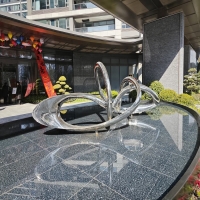Welcome to the website for landscape facilities products and knowledge.
What are the cultural or symbolic implications of the round shape in different markets?
The round shape represents one of humanity's most fundamental and universal forms, carrying profound symbolic weight across different cultures and markets. In Western contexts, the circle typically symbolizes unity, completeness, and perfection—evident in wedding rings representing eternal commitment and Olympic rings signifying global unity. This symbolism extends to corporate branding where circular logos often communicate trust, community, and wholeness.
In Asian markets, particularly within Chinese and Japanese traditions, the circle embodies harmony, balance, and cosmic order. The yin-yang symbol demonstrates perfect equilibrium within circular confinement, while Zen enso circles represent enlightenment, the universe, and the beauty of imperfection. These cultural understandings make circular packaging and branding particularly effective in these markets, where they subtly communicate balance and natural order.
Middle Eastern interpretations often associate circular forms with infinity and divine protection. Islamic art and architecture feature intricate circular patterns reflecting the infinite nature of God, while traditional motifs use circles to represent unity under divine principles. This makes circular designs particularly resonant in markets with significant Islamic influence.
African cultural traditions frequently employ circular shapes to represent community, continuity, and the cyclical nature of life. Many African artworks and symbols use circles to depict social unity and the interconnectedness of all things—from the circular arrangement of traditional villages to ceremonial objects that emphasize collective identity.
Interestingly, modern global marketing has begun creating new universal associations with circular forms. The loading symbol on digital interfaces worldwide, the recycling logo, and global navigation icons all rely on circular imagery that transcends specific cultural boundaries. This demonstrates how ancient symbolic forms continue to evolve and find new meanings in contemporary commercial contexts.
The power of the circle lies in its ability to simultaneously maintain cultural specificity while offering universal appeal. Marketers and designers who understand these nuanced interpretations can leverage circular symbolism to create deeper connections with diverse audiences, making the simple circle one of the most versatile and meaningful shapes in global visual communication.
Related search:

Recommendation
Abstract art sculpture, stainless steel metal sculpture, large-scale water feature sculpture